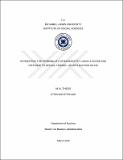Please use this identifier to cite or link to this item:
http://hdl.handle.net/11547/2348Full metadata record
| DC Field | Value | Language |
|---|---|---|
| dc.contributor.author | İftikhar, İftikhar | - |
| dc.date.accessioned | 2019-05-29T11:36:22Z | - |
| dc.date.available | 2019-05-29T11:36:22Z | - |
| dc.date.issued | 2018 | - |
| dc.identifier.uri | http://hdl.handle.net/11547/2348 | - |
| dc.description.abstract | 2008'den bu yana dünya ciddi bir ekonomik durgunlukla karşı karşıya kalmıştır. Bu küresel kriz, birçok bireysel işletmeyi ve çok uluslu şirketi iflasa sürükledi ve bu da küresel ölçekte önemli sosyal etkilere sebep oldu. Hükümetleri ve finans kurumları, milyarlarca dolarlık borca dönüştüren ekonomiyi teşvik etme girişimi ile asal oranın neredeyse sıfıra indirilmesi, işsizlik oranının artması ve gelir oranlarının düşmesi gerçeğine rağmen. İşletmeler, gelir eksikliği ve nakit akışı düzensizlikleri nedeniyle zor durumda kaldılar. Bu ekonomik serpintinin gerçeklerini anlamak için sayısız fırsat mevcuttur, bunlardan biri iflas tahminlerini incelemektir. Bireysel ve kurumsal sektör için ekonomik krizlerden daha az etkilenmek için iflasın daha ciddi bir şekilde öngörülmesi gerekir. Bu araştırmanın amacı, bilanço ve yıllık raporlardan elde edilen bilgi ve verilere dayanarak borsadaki Türk şirketlerinin durumunu analiz etmek için iflas tahmin modellerini incelemektir. Bu tez için Altman‟ın mali oranlarına dayalı Z-Skoru ve Merton‟un DD modeli seçilmiştir. Bu çalışmada, incelenen şirketler Borsa İstanbul Menkul Kıymetler Borsası'nın işlem gören ve 2007 yılından 2016 yılına kadar Türkiye'ye ait finansal olmayan şirketleri temsil etmektedir. Bu çalışmada iflas şansı yüksek olanlarla sağlıklı şirketleri izole etmiştir. Bu araştırma aynı zamanda iflas konularına ve küresel ekonomiye olan harmonik etkilerine ve aynı zamanda diğer endüstriler için kolayca adapte edilebileceklere genel bir bakış sunmaktadır. Sonuçta, bu şirketler için Z-skor modelinin iflasın tahmininde DD modelinden daha iyi performans gösterdiği gözlemlenmiştir. Buna ek olarak, bu araştırma, kredi kuruluşlarına, küçük işletmelere, başarısızlıklarını en aza indirmek ve sağlıklı organizasyonlara ve sağlıksız olanlara yatırım yapmak için mevcut operasyonlarını iyileştirmek için daha iyi bir risk yönetimi sağlamaktadır. | tr_TR |
| dc.language.iso | tr | tr_TR |
| dc.publisher | İSTANBUL AYDIN UNIVERSITY INSTITUTE OF SOCIAL SCIENCES | tr_TR |
| dc.subject | Altman modeli | tr_TR |
| dc.subject | Finansal sıkıntıya olan uzaklık | tr_TR |
| dc.subject | İflas gösterge modelleri | tr_TR |
| dc.subject | Kredi riski | tr_TR |
| dc.subject | Finansal oranlar | tr_TR |
| dc.subject | Altman model | tr_TR |
| dc.subject | Distance to default model | tr_TR |
| dc.subject | Bankruptcy prediction | tr_TR |
| dc.subject | Credit risk | tr_TR |
| dc.subject | Financial ratios | tr_TR |
| dc.title | ESTIMATING THE PROBABILITY OF BANKRUPTCY USING Z-SCORE AND DISTANCE TO DEFAULT MODEL: AN APPLICATION ON ISE | tr_TR |
| dc.type | Thesis | tr_TR |
| dc.description.abstractol | Since 2008, the world has faced a severe economic recession. This global crisis promoted many individual businesses and multi-national corporations to file for bankruptcy, which has crucial social implications globally. Despite the fact that with the intrusion of governments and financial institutions to encourage the economy that has put corporations in billions of dollar of debt, reduces the prime rate to almost zero, increases unemployment rate as well as a decrease in the income rates. Trades became hesitant for spending due to the instability of jobs and personal financial problems. Businesses face tear due to lack of revenues and cautions of cash flows impact the psychology of investors. Logically, the convolution of this crisis is the matter of responsiveness. A countless opportunity is available to understand the facts of this economic fallout. In other words, it is more reasonable to study bankruptcy prediction because of its relevance. It has become essential to predict the bankruptcy more seriously to avoid or minimize the economic crisis for the individual and corporate sector. The objective of this research is to examine the performance of bankruptcy prediction models by data analysis to predict the chances of Turkish companies in the stock market based on information and data available from balance sheets and annual reports. The Altman‟s financial ratios based Z-Score and Merton‟s DD model has been selected for this thesis. It is hypothesized that these prediction models are quite precise to implement for understudy corporations and to compare these models. The study represents Turkey based non-financial firms that are listed in the main market segment of Borsa Istanbul Stock Exchange (ISE) between the years 2007 to the year 2016. It includes the observations on 10 stock listed businesses to find the effect of above-mentioned model. This study proved to be an appropriate tool and isolate the healthy corporations with those who have high chances of bankruptcy. This research also provides an overview on the subject of bankruptcies and their harmonic effects on the global economy as well as easily adapted for other industries. The result shows the projection that Z-score model clearly outperform in predicting the bankruptcy than DD model. The results of the hybrid model (Z-score) are more even than the other. Research also find many other financial factors influencing in the whole scenario of bankruptcy. Additionally, this research provides a better risk management to creditors, small businesses to improve their current operations to minimize failure as well as to invest in healthy organizations and short unhealthy ones. | tr_TR |
| dc.publisher.firstpagenumber | 1 | tr_TR |
| dc.publisher.lastpagenumber | 61 | tr_TR |
| Appears in Collections: | Tezler -- Thesis | |
Files in This Item:
| File | Description | Size | Format | |
|---|---|---|---|---|
| 503240.pdf | 2.05 MB | Adobe PDF |  View/Open |
Items in DSpace are protected by copyright, with all rights reserved, unless otherwise indicated.
